Iran Nuclear Deal Could Be Agreed Very Soon, EU Official Says
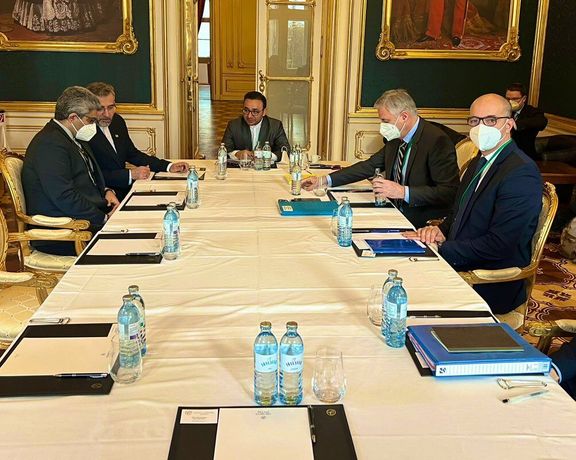
A senior European Union official said Friday that a US-Iranian deal to revive Iran's 2015 nuclear agreement was close but success depended on the political will of those involved.

A senior European Union official said Friday that a US-Iranian deal to revive Iran's 2015 nuclear agreement was close but success depended on the political will of those involved.
"I expect an agreement in the coming week, the coming two weeks or so," the EU official said. "I think we have now on the table text that are very, very close to what is going to be the final agreement," the official said.
Reuters reported on February 17 details of a possible deal negotiated by envoys from Iran, Russia, China, Britain, France, Germany, the European Union and United States.
"Most of the issues are already agreed. But as a principle in this kind of negotiations, nothing is agreed until everything is agreed. So we still have...some questions, some of them rather political and difficult to agree," the official said.
The official said a deal was necessary as Iran's sensitive uranium enrichment program was moving ahead quickly. Iran has always denied it is seeking nuclear weapons.
"On the ground they are advancing very much at a speed that is not compatible with the long-term survival of the JCPOA," the official said, referring to the Joint Comprehensive Plan of Action, as the 2015 nuclear deal between Iran and world powers is formally titled.
Report by Reuters
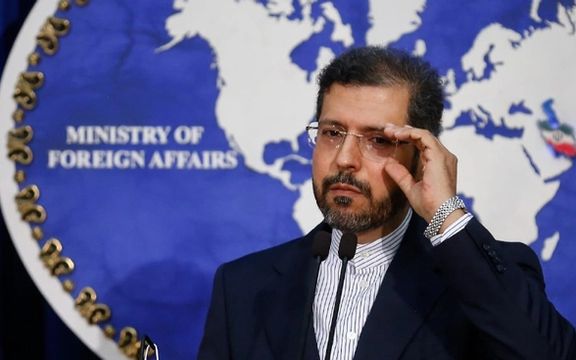
An “exclusive” report by Reuters Thursday on nuclear talks in Vienna was “misinformation disguised as reporting,” an Iranian spokesman tweeted Friday.
Saeed Khatibzadeh, who speaks for the foreign ministry, tweeted that the “final deal to let the US [United States] return to the JCPOA will be far from the unsourced spin making the rounds.” The Reuters news agency report, citing anonymous officials, claimed a series of sequenced steps would be taken in restoring the JCPOA (Joint Comprehensive Plan of Action), the 2015 nuclear deal Iran reached with world powers.
“Expect more spin as we approach final days,” Khatibzadeh warned. The spokesman pointed out that restoring the JCPOA would not be a bilateral arrangement between Iran and the US, meaning it needed endorsement by all JCPOA signatories – China, France, Germany, Iran, Russia, and the United Kingdom.
Russia's chief negotiator to the Vienna talks, Mikhail Ulyanov, in a tweet Thursday wrote that opponents of restoring the JCPOA were "becoming more proactive in the public space" and "trying to create an unhealthy atmosphere."
Reuters on Thursday claimed that a draft text of a plan to restore the JCPOA included sequenced steps including the US initially withdrawing threats to punish third parties holding Iranian assets and Iran stopping enrichment above 5 percent. The report was unclear as to whether such steps depended on prior agreement on full JCPOA restoration.
Psychological warfare
According to Reuters, the first phase of returning to the JCPOA would not include the US lifting its threat of sanctions against third parties buying Iranian oil but would see this threat lifted against South Korean banks, allowing them to transfer $7 billion owed to Iran. But in accepting that the final agreement was in daft, the news agency effectively accepted that these matters remained under discussion.
Nour News, a website close to Iran’s top security official Ali Shamkhani, earlier on Thursday claimed Reuters was distorting talks in Vienna by suggesting Iran had made major concessions. Tehran would not scale back its nuclear program as long as the US did not lift sanctions incompatible with the JCPOA, the website said, also rejecting Reuters' claim that a prisoner swap was part of the talks.
The US Special Envoy for Iran Robert Malley said on January 24 that a nuclear agreement with Tehran was unlikely without the release of Americans detained in Iran, but Iran and Russia have insisted that, whatever is discussed elsewhere, the Vienna talks should not be side-tracked.
Iran’s official news agency IRNA reported Friday that the US was putting off political decisions by setting “fake” deadlines and playing games with the media: The "Americans are trying to throw the ball into Iran's court by playing the blame game as the talks in Vienna approach the final stage.” Tasnim News Agency called the Reuters report "psychological warfare."

A US-Iranian deal taking shape in Vienna lays out phases of mutual steps to bring both sides back into full compliance with the 2015 nuclear agreement, Reuters reported.
The draft text of the agreement, which is more than 20 pages long, stipulates a sequence of steps to be implemented once it has been approved by the remaining parties to the deal, starting with a phase including Iran suspending enrichment above 5% purity, three diplomats familiar with negotiations said.
In the draft being shaped oil sanctions are not included in the first phase, which begins with prisoners and cash release as well as a reduction in the level of Iranian uranium enrichment, according to Reuters.
Reuters news agency noted diplomats “citing the now hackneyed principle that nothing is agreed until everything is agreed.”
The Russian envoy to the talks, Mikhail Ulyanov told Iran International after the release of the Reuters report that parties would reach agreement "definitely by the end of February." He also dismissed the Reuters reference to a release of prisoners, saying that it was not a part of the JCPOA.
The talks have grappled with reconciling which sanctions the United States would need to remove to return to the deal, the JCPOA (Joint Comprehensive Plan of Action), and exactly how the Iranian nuclear program, expanded and improved since 2019, would be brought back within JCPOA limits.
But there have also been complex negotiations over ‘sequencing,’ agreeing a timetable as to how and when both the US and Iran would return to the JCPOA, with proposed steps reportedly included in a 20-page draft document on restoring the deal.
Such sequencing, Thursday’s Reuters report suggested, would begin with a phase in which Iran would scale back enrichment to 5 percent from current levels reaching 60 percent, before subsequently returning to the 3.67 percent cap set by the JCPOA.
The text also refers to step-by-step sequencing measures to be taken by the US, including withdrawing threatened punitive action against Korean banks should they release $7 billion owed to Iran for oil exports, sales that were specifically targeted under the ‘maximum pressure’ sanctions introduced by the US after 2018, when President Donald Trump withdrew from the JCPOA.
The steps outlined in the sequencing would lead, Reuters suggested, to what is already being called ‘Reimplementation Day,’ a date by which the JCPOA would be back in place, around one to three months after basic agreement.
But agreement on sequencing depends on agreement on the final goal, and what would be required from both sides to return to the agreement. Hence “now hackneyed principle that nothing is agreed until everything is agreed.”
Flexibility, violations
Among the hardest issues to resolve are Iran’s use of more advanced centrifuges than permitted under the JCPOA, with Tehran arguing for flexibility – effectively an amendment to the 2015 agreement – given attacks, widely attributed to Israel, that have decommissioned older machines.
Iran has also asked for guarantees that the US will not once again leave the JCPOA. A Middle Eastern diplomat and an Iranian official told Reuters Iran had suggested that the JCPOA be amended to state that if the US again deserted the JCPOA, Tehran could resume enrichment up to 60 percent within the terms of the agreement.
A further complication is judging which US sanctions do and do not violate the JCPOA – a matter complicated by the Trump administration introducing sanctions on other grounds while suggesting this was a means to complicate efforts to renew the JCPOA. Tehran also points to general provisions in the 2015 agreement acknowledging its general right to pursue trade and attract investment.
French Foreign Minister Jean-Yves Le Drian has been among those this week saying only days remained for the talks to achieve their intention. Iran has kept up its calls for ‘guarantees’ and continued to insist it will not meet face-to-face with the US until Washington returns to the JCPOA.
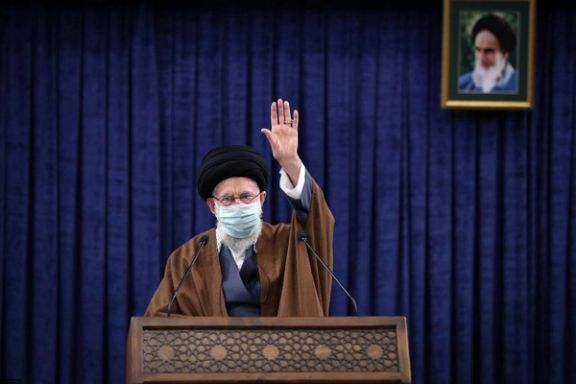
Iran's Supreme Leader Thursday suggested negotiators under president Hassan Rouhani had made errors and not heeded his advice when signing the 2015 nuclear deal.
"My criticism regarding the JCPOA (Joint Comprehensive Plan of Action) was that certain points had to be included to prevent problems from occurring in the future,” Ali Khamenei said in a speech video-linked to an audience in East Azarbaijan province.
Khamenei did not explain this advice but probably referred to his argument, first made in public in 2016, that the United States was not carrying out commitments to lift sanctions as required by the JCPOA. The leader’s speech also relates to Iran’s search in Vienna talks over reviving the JCPOA for US assurances that they will not again leave the deal as President Donald Trump did in 2018.
When Donald Trump won the 2016 US presidential election, calling the JCPOA “the worst deal in history,” and suggested in 2017 he would withdraw the US, Khamenei continued to express skepticism. In speeches in 2018 and 2019, he said he had warned the Rouhani administration of dangers in the JCPOA talks, but given the power structure in the Islamic Republic, every significant decision during talks with the West had to be cleared with Khamenei’s office.
In an interview with the Financial Times published Wednesday, Iran's Foreign Minister Hossein Amir-Abdollahian said Tehran had proposed that the US Congress declare its commitment to a revived JCPOA as way to offer Iran guarantees over US intentions.
Agreement ‘non-binding'
With both Iran and the Biden administration this week signaled that Vienna talks to restore the 2015 deal might be nearing an end, opposition to the JCPOA in both the US and Iran remains live.
An overwhelming majority of Republican lawmakers in the US House of Representatives bluntly rebuffed the suggestion of a Congressional guarantee over the JCPOA. Nearly 170 House members Wednesday sent a letter to President Joe Biden saying they view "any agreement" reached in Vienna not approved by the US Senate as "non-binding,” even if like the JCPOA ratified by the United Nations security council.
With this clear warning displayed on the billboard, if Khamenei allows an agreement in Vienna, the potential mistake could be worse than with the original JCPOA agreement. In 2015, there was more certainty that an agreement will stick, although there was some Congressional opposition. This time, Iran, including JCPOA opponents, are well aware that Republicans have a fair chance of winning majorities in Congress in November and perhaps the presidency in 2024.
Khamenei gave no indication in his Wednesday speech as to whether he thought a revived deal, restoring limits on Tehran’s nuclear program, was likely.
Hadi Moosavi, an Iranian journalist apparently living outside Iran, tweeted that Khamenei was "again" trying to protect himself by casting the blame on others. "So, what's the Leader's duty? It is against his legal and religious duties if he just sits there and says, 'I had said so'. I wish he would say what exactly was not heeded so we would know whether the current negotiation team is heeding them or not," Moosavi opined.
Khamenei in his speech argued that Iran needs civilian nuclear power for the future, but such a program would not need domestic uranium enrichment, as supplies are abundant on the world market. Russia already helps Iran maintain its power plant in Bushehr and has signed agreement to add new reactors. The Bushehr power plant has not been questioned by the United States and European powers.
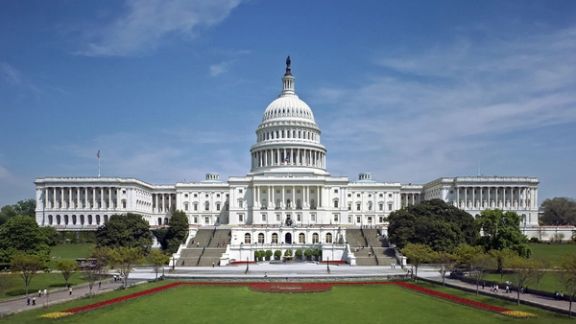
Republican lawmakers in the US House of Representatives have bluntly rebuffed Iran’s suggestion of a Congressional guarantee in the event of a nuclear deal.
Nearly 170 House members Wednesday sent a letter to President Joe Biden saying, "We will view any agreement reached in Vienna which is not submitted to the US Senate for ratification as a treaty — including any and all secret agreements made with Iran directly or on the sidelines of official talks — as non-binding."
Both Iran and the United States this week have signaled that negotiations that began last April might be nearing an end.
Republicans have repeatedly called on Biden to return to the 2015 Obama era agreement, since the Administration announced its intention in early 2021 to revive the JCPOA, abandoned by Donald Trump.
Iran has been insisting that Trump’s unilateral withdrawal from the JCPOA in May 2018 was a violation that can be repeated in the future and the United States must offer “guarantees” it will not happen again. The Biden team has argued that according to the US constitution, the sitting president cannot speak on behalf of a future occupant of the White House, and no such guarantee would be considered binding.
Iran’s foreign minister Hossein Amir-Abdollahian in an interview with the Financial Times on Wednesday said that Iran wants to see a “political statement” by the US Congress essentially endorsing any agreement reached in Vienna and pledging not to reimpose sanctions on Tehran.
“As duly elected representatives of American citizens across the United States…we feel compelled to remind you that you do not have the power to provide any such “guarantee.” Indeed, if you forge an agreement with the Supreme Leader of Iran without formal Congressional approval, it will be temporary and non-binding and will meet the same fate as the Joint Comprehensive Plan of Action (JCPOA),” the letter said.
The overwhelming majority of House Republicans put forth other stringent conditions that if Iran takes them seriously, it will never agree to a deal.
Above all else is the condition that Tehran dismantles all its uranium enrichment capabilities, something that they did not agree to in the original 2015 agreement. Equally important is the demand that Iran should destroy most of its ballistic missiles.
Moreover, the House Republicans, who most likely will receive full support from their Senate comrades, say in the letter that they would oppose any sanctions relief unless Iran “verifiably halted all sponsorship of terrorism, released all American hostages and paid U.S. federal court judgements owed to the American victims of terrorism sponsored by the Iranian regime.”
In the end, the signatories expressed their support for Trump’s ‘maximum pressure’ campaign against Iran which was imposed his withdrawal from the JCPOA. “We urge you to change course, learn from the first JCPOA’s failures, and work with Congress to impose maximum pressure on the Iranian regime,” they told President Biden.
The Administration recently has been publicly condemning the Trump policy that it blames for the current crisis with Iran. Iranian officials have been quick to quote Biden officials in arguing that the United States has broken international law and its measures against Iran have been defeated.
It is not clear how much support the Republicans can expect from Democrats in Congress, but a leading Senate Democratic leader and chairman of the Foreign Relations Committee, Bob Menendez early this month expressed deep concerns over the Biden Administration’s negotiating strategy with Iran.
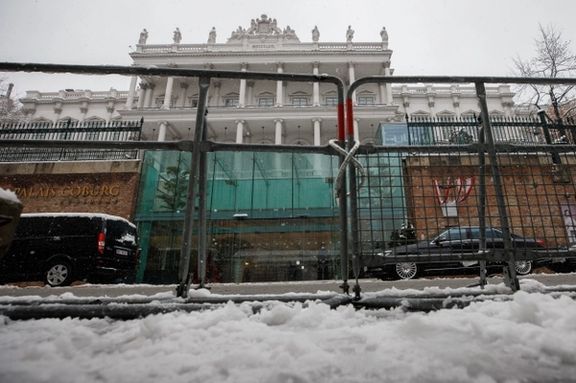
Both the United States and Iran said Wednesday that talks to revive the 2015 nuclear deal are in their final stages, while hedging their bets about the outcome.
State Department spokesperson Ned Price said on Wednesday that the US is in "the midst of the very final stages" of indirect talks with Iran.
"This is really the decisive period during which we'll be able to determine whether a mutual return to compliance with the JCPOA is in the offing, or if it's not."
China's chief negotiator in Vienna, Wang Qun, also told Iran International's correspondent that the next day or two can be decisive in the talks, which are in their final satge.
Iran's top nuclear negotiator, Ali Bagheri Kani said on Twitter on Wednesday that "after weeks of intensive talks, we are closer than ever to an agreement; nothing is agreed until everything is agreed, though."
Iran’s foreign minister Hossein Amir-Abdollahian in an interview with the Financial Times said that any guarantee of a lasting agreement by the Biden Administration would not be enough and Tehran wants an assurance from Congress. Iran has been insisting to receive a guarantee that the US will not withdraw from a deal again, as former President Donald Trump decided to abandon the JCPOA in 2018.
Republicans and some Democrats have serious reservations about President Joe Biden’s Iran policy of reviving the JCPOA.